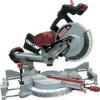Craftsman 21221 Operation Manual - Page 25
FIG. S, T, U, V
 |
View all Craftsman 21221 manuals
Add to My Manuals
Save this manual to your list of manuals |
Page 25 highlights
BEVEL STOP ADJUSTMENTS (FIG. S, T, U, V) WARNING I To avoid injury from unexpected starting or electrical shock, make sure the trigger is released and remove the power cord from the power source. 900(0 °) Bevel adjustment (Fig. S, T) 1. Loosen bevel lock handle (2) and tilt the cutting arm while pushing in the bevel detent pin (3-Fig. T) in against the 0 ° bevel stop. Tighten the bevel lock handle. 2. Place a combination square on the miter table with the rule against the table and heel of the square against the saw blade. 3. If the blade is not 0 ° to the miter table, loosen the four adjustment bolts (1) at the rear of the unit with a 5 mm hex wrench. Unlock the bevel lock handle (2) and adjust the cutting arm zero degrees to the table. Tighten the bevel lock handle and the four adjustment bolts after alignment is achieved. Fig. S 2 Bevel Scale Indicators (Fig. T) 1. When the blade is exactly 90o(0 °) to the table, loosen the bevel indicator screws (1) using a #2 Phillips screwdriver. 2. Adjust bevel indicators (2) to the "0" mark on the bevel scale and retighten the screws. Fig. T 2 45 ° Left Bevel Positive Stop Adjustment (Fig. U) 1. Set the miter angle to zero degrees. Fully extend the sliding fence completely to the left then pull the bevel detent pin (1) toward the front of the machine. NOTE: When retracting the bevel detent pin, it may be required to shift the miter saw upper arm assembly to the left/right. 2. Loosen the bevel lock handle (2) and tilt the cutting arm completely to the left. 3. Using a combination square, check to see if the blade is 45 ° to the table. 4. To adjust, tilt the cutting arm to zero degrees, loosen the Iocknut (3) and turn the bolt (4) in or out accordingly. 5. Tilt the cutting arm back to the left and recheck alignment. 6. Repeat steps until the blade is 45 ° to the table. Once alignment is achieved, tighten the Iocknut (3) to secure the positive stop bolt. 25















